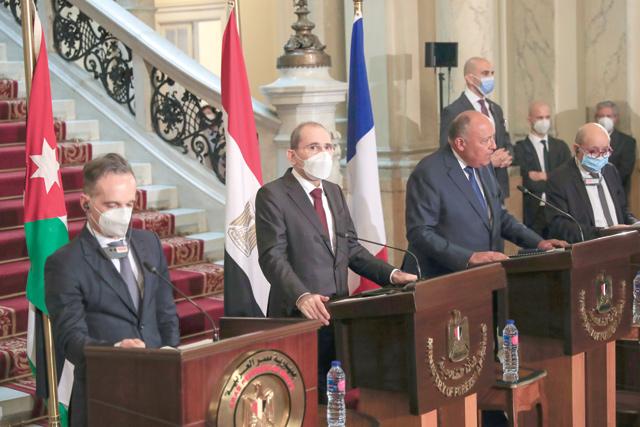You are here
Jordan, Egypt, Germany and France put emphasis on two-state solution
By Maram Kayed - Sep 24,2020 - Last updated at Sep 24,2020
AMMAN — The foreign ministers of Egypt, France, Germany and Jordan met in Amman on Thursday to coordinate and consult on means to advance the Middle East peace process towards a “just, comprehensive and lasting peace”.
According to Foreign Minister Ayman Safadi, this meeting, which is the third of its kind, was set to emphasise that the resolution of the Palestinian-Israeli conflict on the basis of the two-state solution “is the path to achieving a comprehensive and enduring peace and regional security”.
Safadi noted that the two-state solution “ensures the emergence of an independent and viable Palestinian state on the basis of June 4, 1967 lines, living side by side a secure and recognised Israel”.
The ministers stressed that Egypt, France, Germany and Jordan will maintain their active involvement and continue their efforts towards producing a “conducive environment for the resumption of credible negotiations between the Palestinian and Israeli sides”, as stated by a joint statement made available to The Jordan Times after the meeting.
Egyptian Foreign Minister Sameh Shoukry said in a press conference after the meeting that the signing of recent peace agreements between Israel and the UAE as well as Bahrain is “an important step towards regional peace”.
The ministers voiced their countries’ commitment to supporting all efforts to achieve a peace that fulfills the “legitimate rights of all parties on the basis of international law, relevant United Nations resolutions and agreed parameters, including the Arab Peace Initiative”.
“The peace treaties with the UAE and Bahrain could be monumental if Israel decides to use them to pave the way for more peaceful negotiations. If not, the struggle for peace will continue,” Safadi said.
He also noted that the building and expansion of settlements as well as the confiscation of Palestinian structures and properties are a violation of international law that undermine the viability of the two-state solution.
In this regard, the ministers called on both parties to fully implement UNSCR 2334 and all its provisions.
“Recalling our joint statement from July 7, 2020, we take note of the suspension of annexation of Palestinian lands following the announcement of the decision by the United Arab Emirates and Israel to normalise ties and stress that this suspension should become permanent,” noted the ministers’ statement.
French Foreign Minister Jean-Yves Le Drian said during the conference that while the recent peace agreements are “a good step”, the talks between the Palestinians and the Israelis must continue if a peace is to be arrived at.
“Ending the stalemate in peace talks, the creation of political horizons and the restoration of hope through credible dialogue must be a priority. We emphasise the urgency of the resumption of serious, meaningful and effective negotiations on the basis of international law and agreed parameters directly between or under the UN umbrella, including the Middle East Quartet to achieve this peace,” stated the ministers.
German Foreign Minister Heiko Maas was unable to join the meeting in person but was present via video conference.
The meeting was attended by European Union Special Representative for the Middle East Peace Process Susanna Terstal.
The meeting also stressed the importance of upholding the legal and historic status quo of the holy sites in Jerusalem as well as the “indispensable role of UNRWA and the need to provide it with the political and financial support it needs”.
Related Articles
AMMAN — Deputy Prime Minister and Foreign Minister Ayman Safadi on Monday attended the Quartet ministerial meeting, which witnessed the part
AMMAN — Deputy Prime Minister and Foreign Minister Ayman Safadi on Tuesday reiterated the necessity of resuming “serious” negotiations towar
AMMAN — Foreign Minister Ayman Safadi on Tuesday met with EU Special Representative for the Middle East Peace Process Fernando Gentilini, th

















